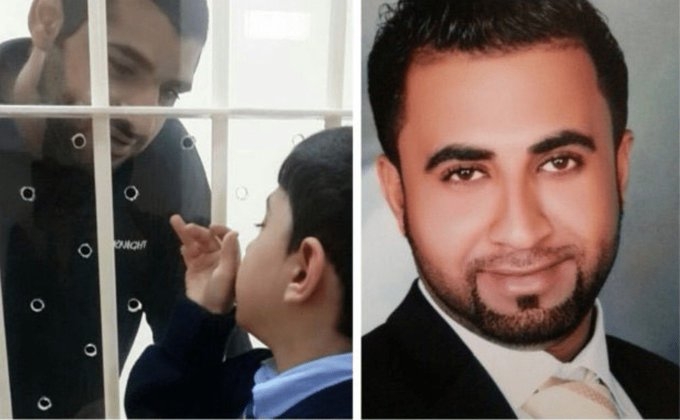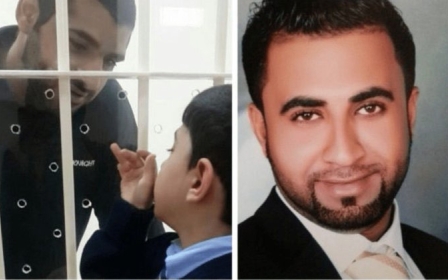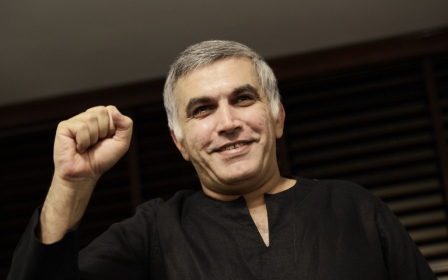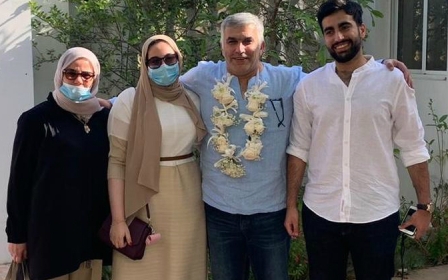Bahrain's final appeal court set to rule on fate of activists facing execution

Two Bahraini democracy activists are again facing death sentences after being convicted of murder on the basis of confessions allegedly extracted under torture.
Mohammed Ramadhan and Hussein Moosa were leading figures in the pro-democracy protests of 2011 before the demonstrations were crushed with the assistance of Saudi Arabia and the UAE.
In 2014 the two men were arrested for questioning about the death of a policeman who was killed in a bomb blast in a village north east of the capital Manama.
Ramadhan refused to sign a confession but Moosa says he signed a statement in which he made a false confession and incriminated Ramadhan after being suspended by his limbs and beaten for several days.
Both men were sentenced to death, although their case was reopened – under international pressure – and interior ministry doctors later reported that there was medical evidence to support their allegations of torture.
New MEE newsletter: Jerusalem Dispatch
Sign up to get the latest insights and analysis on Israel-Palestine, alongside Turkey Unpacked and other MEE newsletters
The courts upheld the original conviction, however, and on Monday Bahrain’s Court of Cassation is widely expected to reimpose the death penalty.
Since 2017, Bahrain has hanged six people, five of them convicted on the basis of confessions allegedly extracted under torture.
There are now thought to be 26 people on death row in the country.
The London-based human rights group Reprieve describes Bahrain's criminal justice system as "broken" and complains that it has for years "been propped up and sustained by taxpayer-funded support from the UK."
The Bahraini government’s Ombudsman’s Office within the interior ministry and the Special Investigations Unit (SIU) within the justice ministry have responsibility for investigating torture.
Both organisations have received training and support from the UK, yet both have been described by the United Nations Committee Against Torture as being ineffective and lacking independence.
'Time to intervene'
On Wednesday there were calls in the UK parliament's upper chamber, the House of Lords, for the British government to put pressure on the Bahraini authorities to secure a reprieve for the two men.
Frances D'Souza, a baroness in the Lords, said the UK government needed to issue a strong protest, in public.
Paul Scriven, a Liberal Democrat member of the Lords, said the UK government should accept that its support for the Bahraini criminal justice system had failed, and suspend it if the death penalties are upheld.
Meta Ramsay, a Labour member of the Lords, said that the UK’s foreign office should "put its mouth where British money is going" and secure a stay of execution and a fair trial for the two men.
Responding for the government, Tariq Ahmad, a foreign office minister, said that the UK was "deeply concerned" by the death sentences, and was making representations at the highest level.
However, Ahmad failed to reassure the Lords that the UK government would do this ahead of Monday's sentencing, saying only that "it is for the Court of Cassation to make the final decision."
Sayed Ahmed Alwadaei, director of advocacy at the Bahrain Institute for Rights and Democracy, commented: "At this point Bahrain should have learned that upholding the death sentences against these torture survivors will not pass without consequence.
"These men have suffered enough injustice at the hands of Bahrain's corrupt judiciary and I welcome the important intervention by peers in the House of Lords this afternoon."
Reprieve director Maya Foa said: "The Government continues to claim that British security assistance to Bahrain has 'yielded positive results,' yet next Monday, two Bahraini men are very likely to be sentenced to death on the basis of torture evidence, following a sham investigation into their mistreatment, supported by British taxpayers.
"Faced with evidence that UK support to Bahrain has failed and is a fig leaf for severe human rights violations and denial of due process, all Lord Ahmad said is that the Government continues to monitor the case. The time for monitoring is long past: it is time to intervene, to save these men's lives."
Middle East Eye delivers independent and unrivalled coverage and analysis of the Middle East, North Africa and beyond. To learn more about republishing this content and the associated fees, please fill out this form. More about MEE can be found here.




